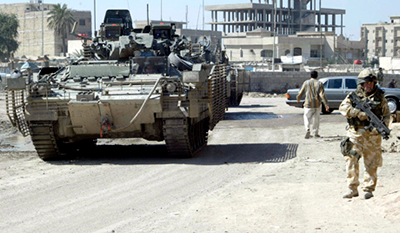British soldiers are more likely to commit violent crime than their civilian counterparts. In the first study of its kind, psychiatrists compared statistics on crimes by soldiers with the UK’s official criminal records database. The report says soldiers who served in Iraq and Afghanistan are 50 per cent more likely to become criminals than other civilians.
2013 marks 10 years since the invasion of Iraq. The former trooper with the Royal Tank Regiment Neil Blower was there.
“I was in Iraq in 2003 for the invasion. And my troop sergeant was killed. He was the first really soldier killed in action in Iraq. And that’s probably the single biggest factor in my PTSD.
If you broke your lack you wouldn’t walk around on it for years without seeing a doctor of getting it fixed. You need aid, right? And it’s the same with psychological injuries. The longer you leave it the worse it gets.”
For the first time a report into the psychiatric fallout from the Iraq war has been published in the Lancet to mark the decade since the invasion led by the British and American armed forces.
Researchers from King’s College London studied almost 14,000 serving and ex military personnel and official crime records. And in fact, men who had served in the UK Armed Forces are more likely to commit a violent offence during their lifetime than their civilian counterparts.
Dr Deirdre MacManus from King’s College London led the research.
“It’s the first study that is suggesting that this is a problem. Far and above the strongest risk factors for violence within this population are background risk factors, socio-demographics and a history of offending prior to joining the military.
But on top of that we’ve found that being deployed in a combat role and experiencing traumatic events on deployment increases your risk of violence. We also found that on return, if individuals engage in excess alcohol misuse, so they develop mental health problems, such as PTSD, then that also increases the risk.
I think the emphasis needs to move to once they leave the military and the problems that they experienced there, on what we could do at that point.”
Out of 13856 men in the armed forces 17% had a criminal record. One startling discovery was that the majority of people with lifetime criminal records were in fact ex British military men.
Trooper and talented author Neil Blower says living with PTSD is an isolating experience. But associating all soldiers with violent crime, as some newspaper headlines suggest, isn’t fair on veterans.
“It is tarring everybody with the same brush. People are very proud of the service, you know, I am… and for the headlines to be – people who do an active service are going to commit crimes, and be violent and all like – it is very irresponsible as such. It is very reactionary, shocking value.”
Neil Blower says Britain’s Ministry of Defense must take more of a responsibility for the former soldiers, one reason why he decided to write a book about his experience.
“The way you are going to turn from a civilian into soldier, going from a soldier back to a civilian is a very-very difficult transition to make, and especially if you’ve been serving in a war. And I think the MoD and the Government certainly needs to look at how to do that because I do think a lot of it is because you are just left.
And certainly in my day you were a soldier one day and then a civilian the next, you losing a comrade. The symptoms of PTSD that I went through are in the book. You have nightmares, get up in the middle of the night and not able to go back to sleep. I think about it pretty much every day, it never leaves you.”
The report also found that alcohol abuse, PTSD and high levels of self-reported aggressive behavior after serving in Iraq were strong predictors of subsequent violent offending.
“Alcohol misuse is a risk factor for violence. But alcohol misuse is a risk factor for violence in the general population as well. We just happened to know that within the military alcohol is a problem and it is more of a problem than in the general population. And understandably it is often used as a coping mechanism.
And if alcohol consumption reduces your inhibitions, can lead to an impulsive behavior, then you can understand how that can be a risk factor for violence. Put that together with problems with hyper-arousal, and yes, other findings of ours do show that alcohol in combination with PTSD increases your risk further.”
This new research and subsequent media coverage raises bigger questions about the state of mental healthcare for ex-service men and women in the UK.
Meanwhile, the Ministry of Defense which funded the research said it is committed to supporting soldiers and their families after deployment. In a statement the MoD said – mental health support was available before, during and after operations, according to Voice of Russia.
M.D

